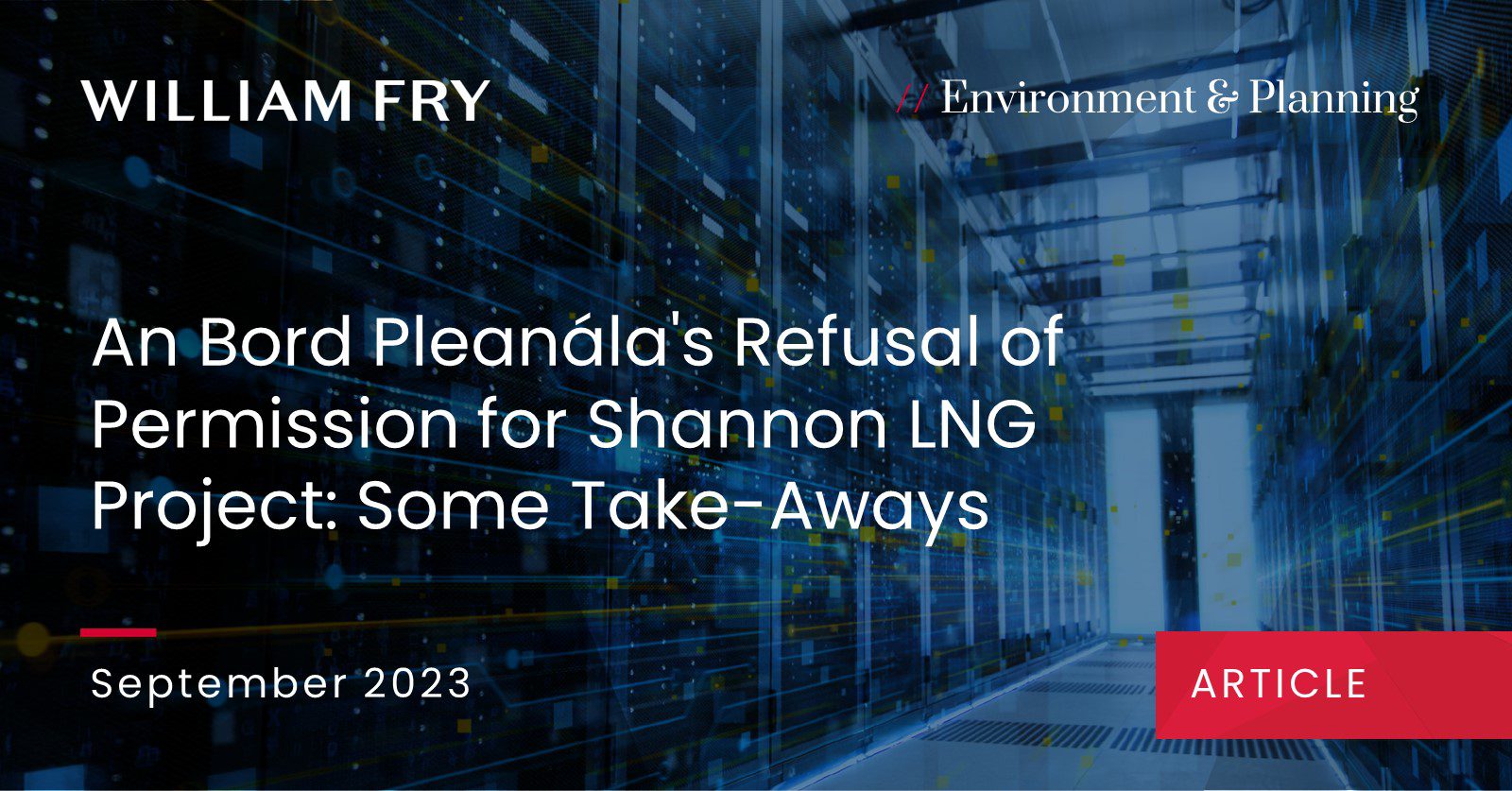On Friday, 15 September 2023, An Bord Pleanála (Board) refused permission for the development of a liquified natural gas (LNG) terminal and power station proposed for Tarbert on the Shannon Estuary.
The Board’s decision on the project has been awaited with interest. This is because of the scale of the project, contentions over its role in the national energy security debate, and (in the context of climate policy) the project’s association with natural gas, a fossil fuel. The Board’s analysis of the proposal and its reasons for refusal are being widely studied for any broader ramifications. The following are our immediate observations.
An increased role for Government policy in future Planning?
In its refusal of permission for the LNG project, the Board:
- cited the reference in the “Policy Statement on the Importation of Fracked Gas” (May 2021) to the effect that it would not be appropriate to proceed with any LNG terminals in Ireland pending completion of the review of the security of energy supply of Ireland’s electricity and natural gas systems; and
- The Board noted that the Review (i) is not complete, and (ii) nevertheless, there is an initial technical analysis relating to that ongoing Review that, per the Board, does not support a private commercial LNG facility.
These were the central reasons underlying the refusal. However, it does not follow that in other decisions, relevant government policy is set to move centre-stage to the same extent and displace a more holistic consideration by the Board. The LNG proposal had unique characteristics: it was proposed nationally as a piece of ‘strategic infrastructure development’. That feature, coupled with LNG as a technology representing a significant new departure for Ireland, plus the long-running public controversy surrounding the Tarbert proposal, all combined to mean that a single proposed installation became the subject of government policy documents and positions. So, the Tarbert proposal’s size, scale, novelty, and controversy forced a governmental stance on the Project and ensured that that position came to the fore as the central planning issue for the Board to consider.
While the question currently remains unanswered, whether LNG as a technology ultimately has a role in Ireland’s future energy security looks like boiling down to a binary choice. That is less the case with other technologies or facilities where the government has taken a strategic position; data centres being the case most obviously in point. The “Governmental Statement on the Role of Data Centres in Ireland’s Enterprise Strategy”, from July 2022, is an important reference point for planning authorities and the Board but, crucially, does not take a binary “acceptable” or “unacceptable” stance. Instead, it sets out a series of tests or criteria which specific data centre proposals should be assessed against. This more nuanced approach is necessitated by data centres implicating not just energy security and decarbonisation policies but also the government’s priority of digitalisation.
Regional objectives/planning policy
Another notable point from the Board’s LNG decision was the considerable emphasis on regional planning policy and regional economic strategy. This featured in how the Board responded to its Inspector’s recommendation that the gas-fired power plant element of the overall LNG facility be granted permission. The Inspector recommended a “split decision”: the Board refuses permission for the LNG installation but grants permission for the onshore gas-fired power plant. The Board did not follow that recommendation and refused consent for the power plant. The Board found that the LNG and the combined cycle power plant (CCGT) elements were too closely integrated technically and that granting the power plant on its own would permit a materially different project from what was applied for.
What is particularly notable about that refusal is the Board’s strong reliance on the “Strategic Integrated Framework Plan for the Shannon Estuary” (SIFP) and, in turn, on the “Regional Spatial Economic Strategy for the Southern Region”. That part of the Board’s decision, refusing permission for the CCGT, involved the Board saying that the applicant had not dealt sufficiently with how the project was consistent with regional development strategies.
Further recognition of gas as a transition fuel
Interestingly, the Inspector’s justification for recommending permission for the CCGT element of the project was partly based on national energy and climate policies’ acceptance of gas as a necessary part of the transition to renewables. The Board did not question this element of the Inspector’s reasoning.
For further information on this decision and related issues, contact our Environmental & Planning team.



